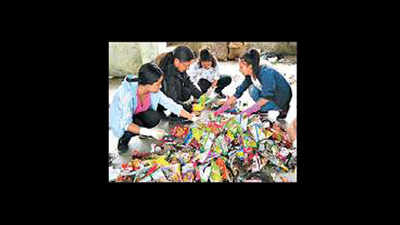- News
- City News
- kolkata News
- From October, homestays in Darjeeling to shun plastic
Trending
This story is from September 28, 2018
From October, homestays in Darjeeling to shun plastic

Volunteers sift through mounds of plastic wrappers during a clean-up drive around the Mall
KOLKATA: Get ready for a plasticfree experience the next time you visit Darjeeling and pick a homestay for your vacation.
The 250-odd homestays in Darjeeling, Kurseong, Mirik, Lamahata and Ghumthe hills have declared war on plastic, pledging to replace bottled water with filtered water and plastic cups with earthen ones to stop the Queen of the Hills from turning into a giant garbage dump.

From October 1, if you check into any of these homestays, your host will serve you water in thermosteel or unisteel bottles to be returned after use; and the tea will be served in earthen cups. Homestays have also decided to minimise the use of other plastic materials.
Volunteers sift through mounds of plastic wrappers during a clean-up drive around the Mall
Plastic made 95% of waste in Hills
The Himalayan Homestay Owners’ Association brought out a cycle rally in the hills on Thursday, on the occasion of World Tourism Day, to generate awareness over the issue.
“Darjeeling is one of the untidiest hill towns today because of the rampant use of plastic, which chokes sewer lines and is also responsible for the increasing number of landslides,” Prasant Pradhan said.
Hill economics largely revolves around tourism, with every family dependent on this industry directly or indirectly. Lakhs of tourists visit the hills every year and leave behind thousands of tonnes of plastic trash. The garbage finds its way into sewers, rivers and streams, triggering landslides. Non-biodegradable plastic waste also absorbs heat, resulting in a consequent rise in temperature.
Neighbouring Sikkim banned the use of plastic bags in 1998 after these started blocking drains and caused a spate of landslides. The state also stopped the use of bottled water in government offices and functions in 2016.
Darjeeling’s homestays will also urge guests not to bring bottled water to the hills. “We will display certificates, stating that our water is safe,” Anuj Chettri of the Mirik Homestay Owners’ Association said.
More than 200 organisations and 15,000 volunteers carried out one of the biggest clean-up drives across 12 Himalayan states on May 26 this year. In Bengal, the drive was undertaken at 37 pockets, including Darjeeling, Kurseong, Mirik and Ghum, in Bengal.
“Almost 95% of the waste was plastic,” said Roshan Rai of the Darjeeling chapter of Zero Waste Himalayas, an NGO which co-anchored the Himalayan clean-up. “If we want to save the hills, we will have to ban single-use plastic and phase out multi-layered plastics. Strict laws need to be formulated to check this pollution,” said Rai.
The 250-odd homestays in Darjeeling, Kurseong, Mirik, Lamahata and Ghumthe hills have declared war on plastic, pledging to replace bottled water with filtered water and plastic cups with earthen ones to stop the Queen of the Hills from turning into a giant garbage dump.

From October 1, if you check into any of these homestays, your host will serve you water in thermosteel or unisteel bottles to be returned after use; and the tea will be served in earthen cups. Homestays have also decided to minimise the use of other plastic materials.
“The war on plastic is a fight for our own survival,” Himalayan Homestay Owners’ Association general secretary Prasant Pradhan said.
Volunteers sift through mounds of plastic wrappers during a clean-up drive around the Mall
Plastic made 95% of waste in Hills
The Himalayan Homestay Owners’ Association brought out a cycle rally in the hills on Thursday, on the occasion of World Tourism Day, to generate awareness over the issue.
“Darjeeling is one of the untidiest hill towns today because of the rampant use of plastic, which chokes sewer lines and is also responsible for the increasing number of landslides,” Prasant Pradhan said.
Hill economics largely revolves around tourism, with every family dependent on this industry directly or indirectly. Lakhs of tourists visit the hills every year and leave behind thousands of tonnes of plastic trash. The garbage finds its way into sewers, rivers and streams, triggering landslides. Non-biodegradable plastic waste also absorbs heat, resulting in a consequent rise in temperature.
Neighbouring Sikkim banned the use of plastic bags in 1998 after these started blocking drains and caused a spate of landslides. The state also stopped the use of bottled water in government offices and functions in 2016.
Darjeeling’s homestays will also urge guests not to bring bottled water to the hills. “We will display certificates, stating that our water is safe,” Anuj Chettri of the Mirik Homestay Owners’ Association said.
More than 200 organisations and 15,000 volunteers carried out one of the biggest clean-up drives across 12 Himalayan states on May 26 this year. In Bengal, the drive was undertaken at 37 pockets, including Darjeeling, Kurseong, Mirik and Ghum, in Bengal.
“Almost 95% of the waste was plastic,” said Roshan Rai of the Darjeeling chapter of Zero Waste Himalayas, an NGO which co-anchored the Himalayan clean-up. “If we want to save the hills, we will have to ban single-use plastic and phase out multi-layered plastics. Strict laws need to be formulated to check this pollution,” said Rai.
End of Article
FOLLOW US ON SOCIAL MEDIA










